That's, again, your interpretation. You are so defensive that there's really not reasoning with you.
Have you, for example,considered also reading the line that isn't highlighted?
Anger management, bro.
18.02.2025 02:31 — 👍 3 🔁 0 💬 2 📌 0
It is very clear here that we have folks interpreting it in different ways. You can pretend they don't exist, but that doesn't mean they actually don't.
18.02.2025 02:26 — 👍 1 🔁 0 💬 0 📌 0
No one is saying the title misled. You're in a strangely defensive posture.
Nothing ruled out the possibility that after the affidavit was submitted, something didn't happen to the woman or baby.
Being less deterministic about ways things may be interpreted is a skill that could benefit you.
18.02.2025 02:25 — 👍 2 🔁 0 💬 1 📌 0
It's pretty common for judges to want more time to think abut the arguments and effects of their decisions for rulings.
18.02.2025 02:20 — 👍 4 🔁 1 💬 0 📌 0
This is the problem with influencers pushing the narrative that specialists (govt, science, etc) don't actually know more than anybody else, and just use their titles and elite status to grift. In that warped reality, facts are the provenance of opinion, and deciding for yourself is a virtue. Chaos.
18.02.2025 01:22 — 👍 5 🔁 1 💬 0 📌 0
I disagree.
18.02.2025 02:10 — 👍 2 🔁 0 💬 1 📌 0
It did kind of read like fromhis post that this was filed and then the baby or mom may have died after it was filed. Clarification isn't a bad idea and I did read it. I do think you're right about what he meant though.
18.02.2025 02:05 — 👍 43 🔁 0 💬 0 📌 0
This is a great thread.
18.02.2025 01:10 — 👍 0 🔁 0 💬 0 📌 0
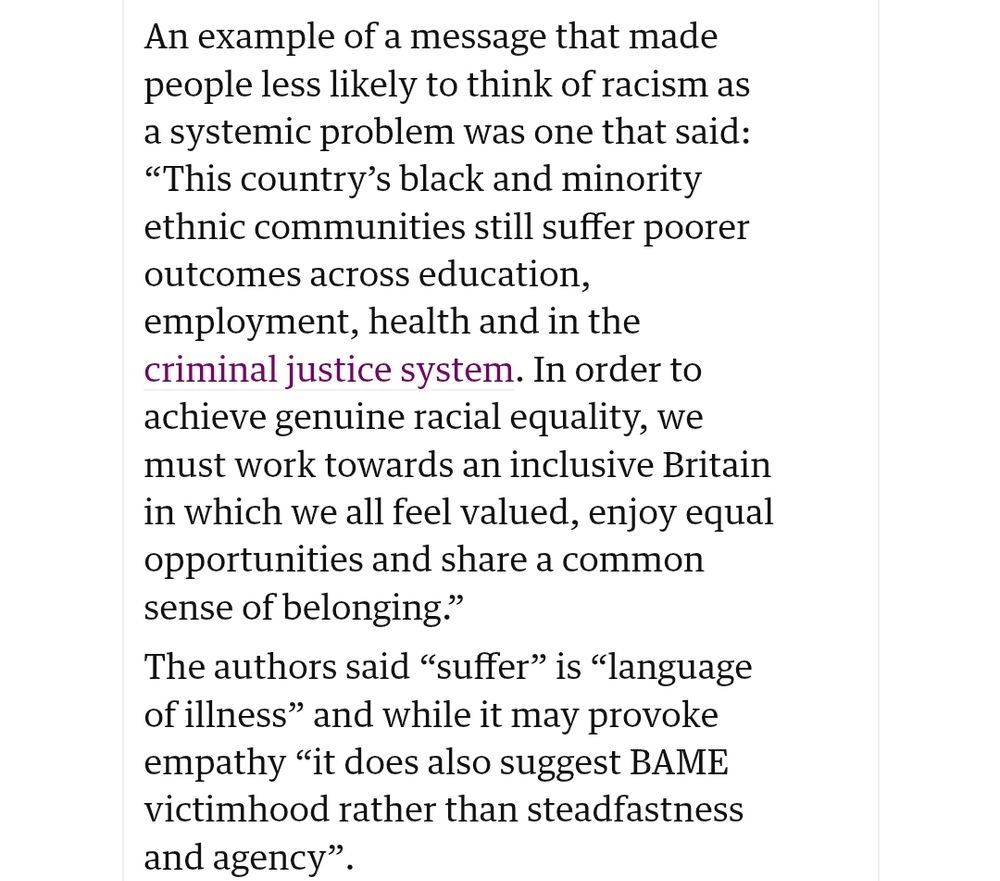
An example of a message that made people less likely to think of racism as a systemic problem was one that said: “This country’s black and minority ethnic communities still suffer poorer outcomes across education, employment, health and in the criminal justice system. In order to achieve genuine racial equality, we must work towards an inclusive Britain in which we all feel valued, enjoy equal opportunities and share a common sense of belonging.”
The authors said “suffer” is “language of illness” and while it may provoke empathy “it does also suggest BAME victimhood rather than steadfastness and agency”.
The authors said “suffer” is “language of illness” and while it may provoke empathy “it does also suggest BAME victimhood rather than steadfastness and agency”.
18.02.2025 00:59 — 👍 0 🔁 0 💬 0 📌 0

Researchers believe they may have found the best way to convince the public that racism is a real problem and requires major change: tell them about an Oxford University study exposing discrimination faced by job applicants.
A groundbreaking project exploring how better to boost public support for action against systemic racism tested which messages best move people towards a more anti-racist position.
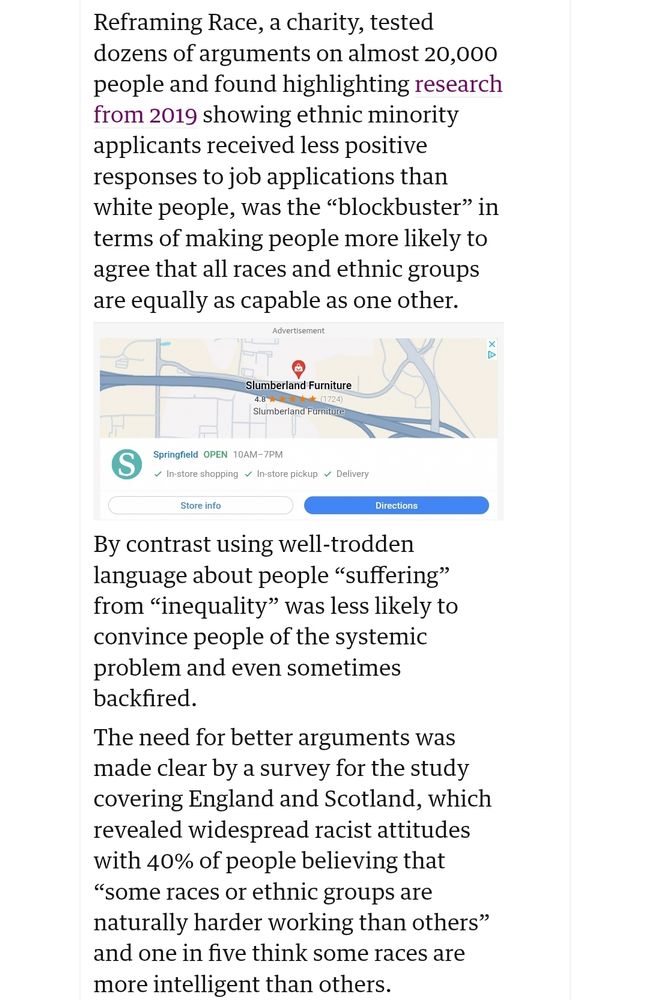
Reframing Race, a charity, tested dozens of arguments on almost 20,000 people and found highlighting research from 2019 showing ethnic minority applicants received less positive responses to job applications than white people, was the “blockbuster” in terms of making people more likely to agree that all races and ethnic groups are equally as capable as one other.
By contrast using well-trodden language about people “suffering” from “inequality” was less likely to convince people of the systemic problem and even sometimes backfired.
The need for better arguments was made clear by a survey for the study covering England and Scotland, which revealed widespread racist attitudes with 40% of people believing that “some races or ethnic groups are naturally harder working than others” and one in five think some races are more intelligent than others.
![The research also showed it remained easier to get audiences to accept racism as a real and pressing problem than to get them to support particular solutions.
“If we want to end racism and entrench anti-racism it is critical to build public demand for deep and irreversible progress,” said Sanjiv Lingayah, report author and director of Reframing Race. “[This] shows there is still a way to go. The data shows significant attachment to deep-seated and debunked myths about ‘race’. More positively, the findings show that the public can understand systemic racism and that they can be rallied around far-reaching anti-racist solutions.”](https://cdn.bsky.app/img/feed_thumbnail/plain/did:plc:xej3e5jl7pnnsytmypwn5nuz/bafkreiarkxy5knawzgwcl2tiqrs7edaigt4cajyh25pna2xyetyfbzxjce@jpeg)
The research also showed it remained easier to get audiences to accept racism as a real and pressing problem than to get them to support particular solutions.
“If we want to end racism and entrench anti-racism it is critical to build public demand for deep and irreversible progress,” said Sanjiv Lingayah, report author and director of Reframing Race. “[This] shows there is still a way to go. The data shows significant attachment to deep-seated and debunked myths about ‘race’. More positively, the findings show that the public can understand systemic racism and that they can be rallied around far-reaching anti-racist solutions.”
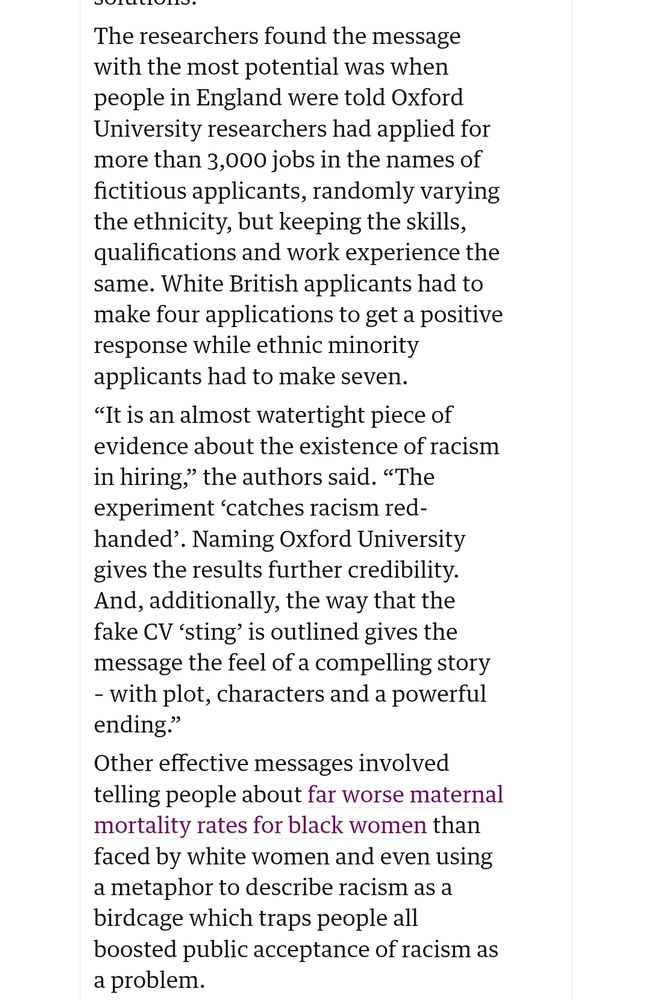
The researchers found the message with the most potential was when people in England were told Oxford University researchers had applied for more than 3,000 jobs in the names of fictitious applicants, randomly varying the ethnicity, but keeping the skills, qualifications and work experience the same. White British applicants had to make four applications to get a positive response while ethnic minority applicants had to make seven.
“It is an almost watertight piece of evidence about the existence of racism in hiring,” the authors said. “The experiment ‘catches racism red-handed’. Naming Oxford University gives the results further credibility. And, additionally, the way that the fake CV ‘sting’ is outlined gives the message the feel of a compelling story – with plot, characters and a powerful ending.”
Other effective messages involved telling people about far worse maternal mortality rates for black women than faced by white women and even using a metaphor to describe racism as a birdcage which traps people all boosted public acceptance of racism as a problem.
Job discrimination faced by ethnic minorities convinces public about racism (2022)
Study finds the best way to convince the public that racism is a real problem and requires major change: tell them about a study exposing discrimination faced by job applicants.
www.theguardian.com/money/2022/d...
18.02.2025 00:57 — 👍 2 🔁 0 💬 1 📌 0
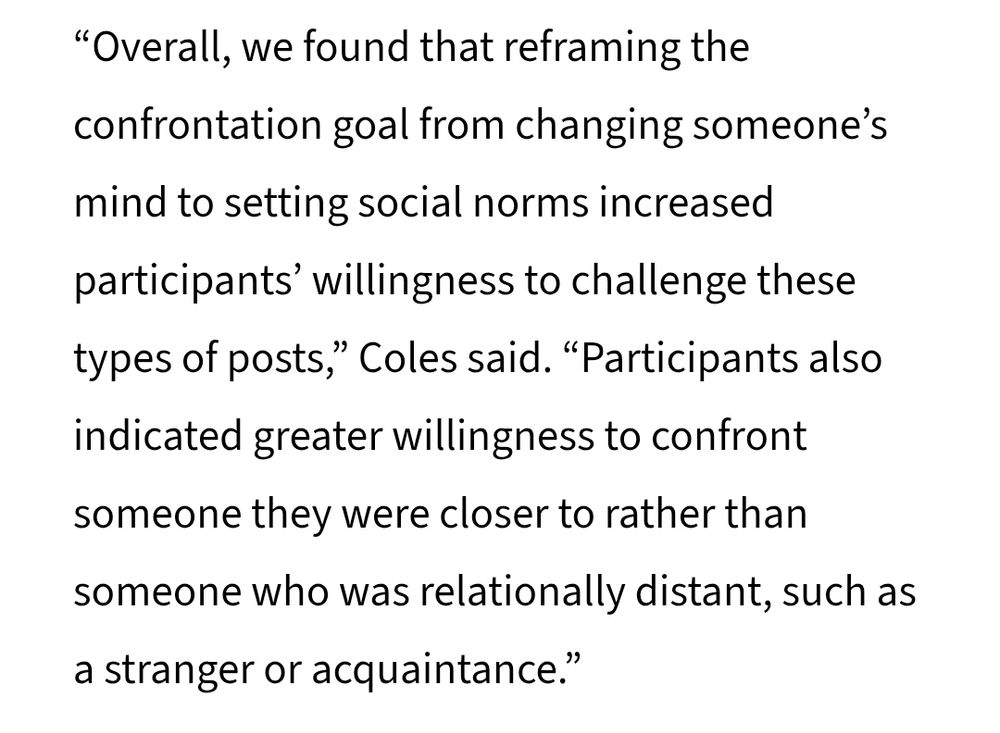
“Overall, we found that reframing the confrontation goal from changing someone’s mind to setting social norms increased participants’ willingness to challenge these types of posts,” Coles said. “Participants also indicated greater willingness to confront someone they were closer to rather than someone who was relationally distant, such as a stranger or acquaintance.”
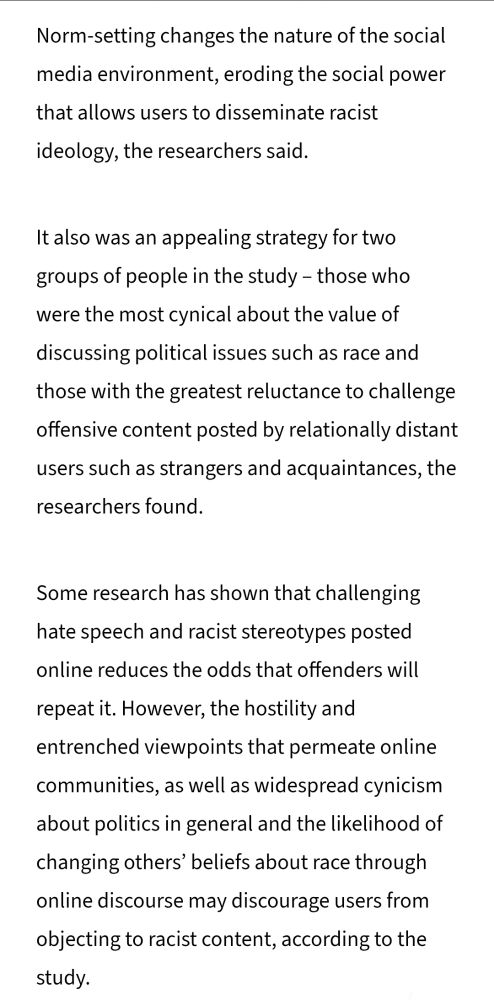
Norm-setting changes the nature of the social media environment, eroding the social power that allows users to disseminate racist ideology, the researchers said.
It also was an appealing strategy for two groups of people in the study – those who were the most cynical about the value of discussing political issues such as race and those with the greatest reluctance to challenge offensive content posted by relationally distant users such as strangers and acquaintances, the researchers found.
Some research has shown that challenging hate speech and racist stereotypes posted online reduces the odds that offenders will repeat it. However, the hostility and entrenched viewpoints that permeate online communities, as well as widespread cynicism about politics in general and the likelihood of changing others’ beliefs about race through online discourse may discourage users from objecting to racist content, according to the study.
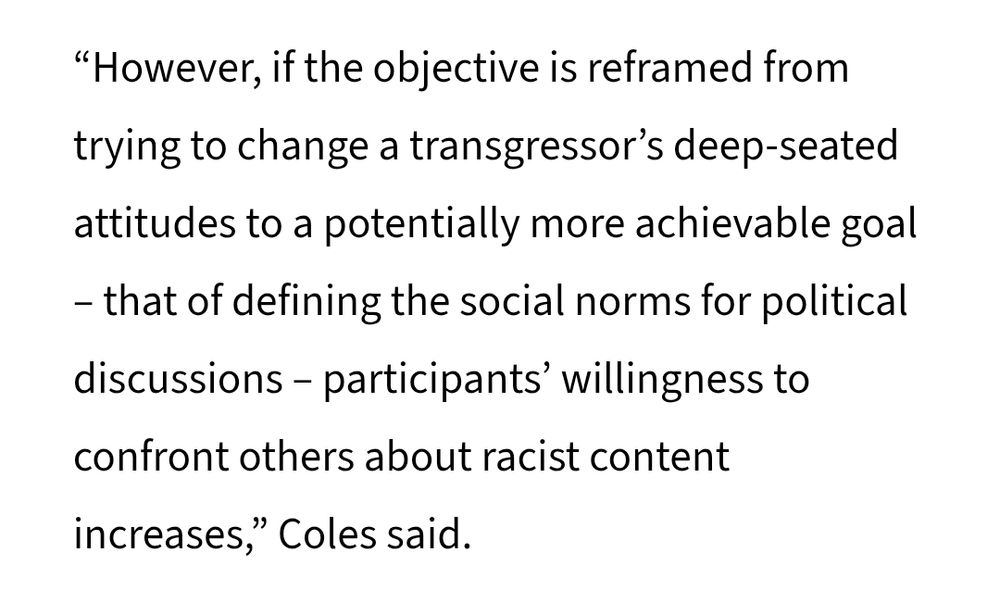
"However, if the objective is reframed from trying to change a transgressor’s deep-seated attitudes to a potentially more achievable goal – that of defining the social norms for political discussions – participants’ willingness to confront others about racist content increases,” Coles said.
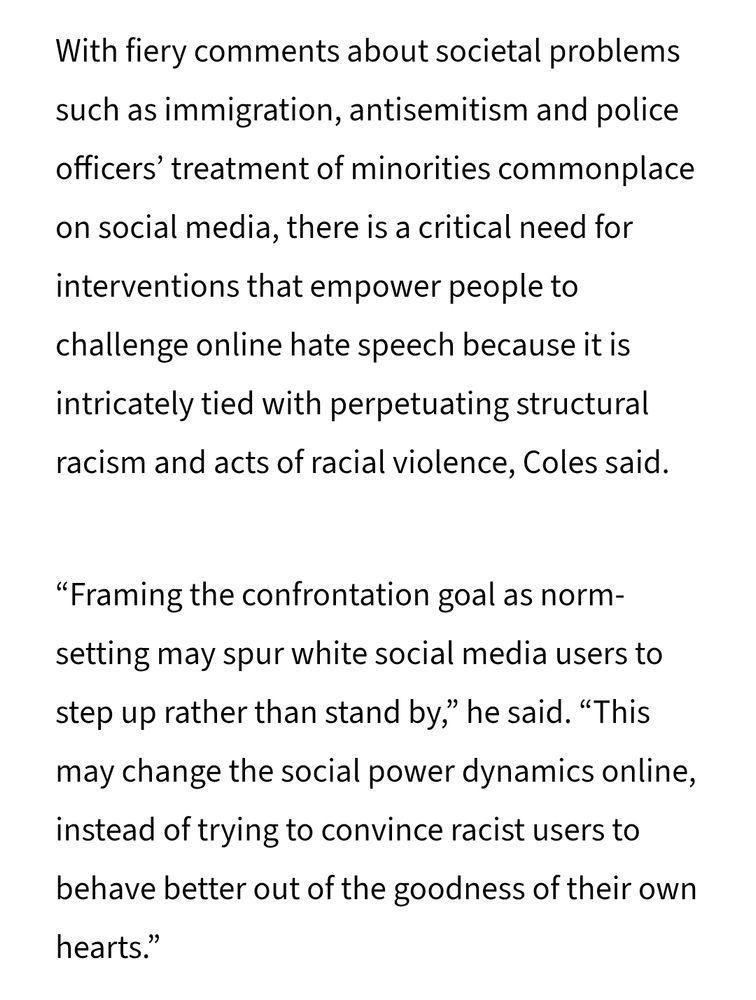
With fiery comments about societal problems such as immigration, antisemitism and police officers’ treatment of minorities commonplace on social media, there is a critical need for interventions that empower people to challenge online hate speech because it is intricately tied with perpetuating structural racism and acts of racial violence, Coles said.
“Framing the confrontation goal as norm-setting may spur white social media users to step up rather than stand by,” he said. “This may change the social power dynamics online, instead of trying to convince racist users to behave better out of the goodness of their own hearts.”
White people more likely to confront authors of racist online posts to set discussion rules (2024)
White people surveyed indicated they'd be more likely to confront those posting racist content to defend norms for political discussion, not change their prejudices.
news.illinois.edu/white-people...
18.02.2025 00:48 — 👍 1 🔁 0 💬 0 📌 0
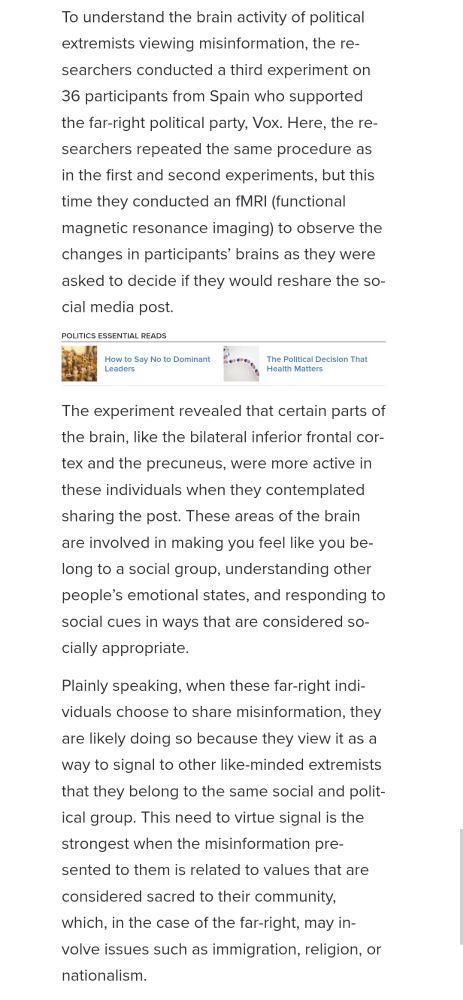
To understand the brain activity of political extremists viewing misinformation, the researchers conducted a third experiment on 36 participants from Spain who supported the far-right political party, Vox. Here, the researchers repeated the same procedure as in the first and second experiments, but this time they conducted an fMRI (functional magnetic resonance imaging) to observe the changes in participants’ brains as they were asked to decide if they would reshare the social media post.
The experiment revealed that certain parts of the brain, like the bilateral inferior frontal cortex and the precuneus, were more active in these individuals when they contemplated sharing the post. These areas of the brain are involved in making you feel like you belong to a social group, understanding other people’s emotional states, and responding to social cues in ways that are considered socially appropriate.
Plainly speaking, when these far-right individuals choose to share misinformation, they are likely doing so because they view it as a way to signal to other like-minded extremists that they belong to the same social and political group. This need to virtue signal is the strongest when the misinformation presented to them is related to values that are considered sacred to their community, which, in the case of the far-right, may involve issues such as immigration, religion, or nationalism.
Experiment #3
When far-right individuals choose to share misinformation, virtue signal.
Virtue signaling is strongest when the misinformation presented relates to sacred community values (immigration, religion, nationalism).
18.02.2025 00:14 — 👍 0 🔁 0 💬 0 📌 0
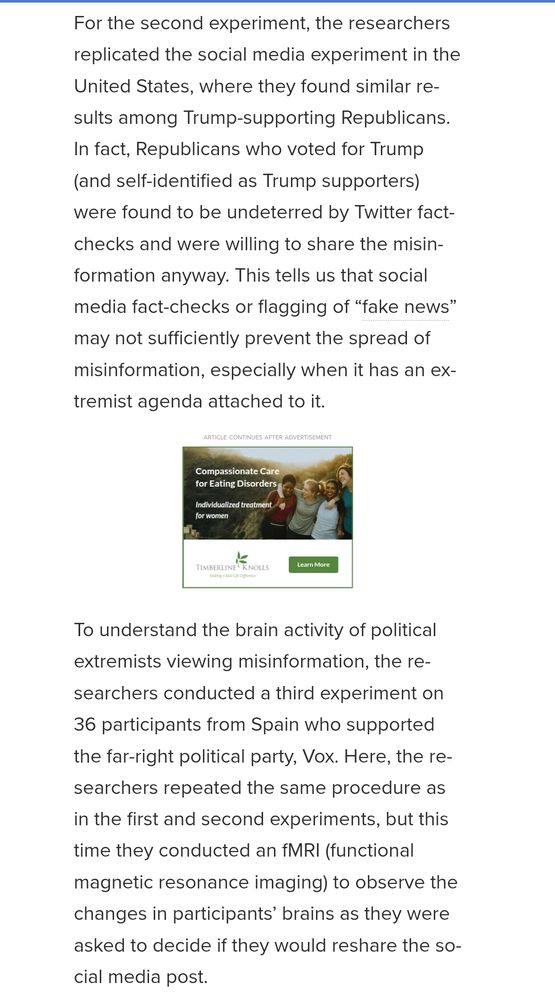
For the second experiment, the researchers replicated the social media experiment in the United States, where they found similar results among Trump-supporting Republicans. In fact, Republicans who voted for Trump (and self-identified as Trump supporters) were found to be undeterred by Twitter fact-checks and were willing to share the misinformation anyway. This tells us that social media fact-checks or flagging of “fake news” may not sufficiently prevent the spread of misinformation, especially when it has an extremist agenda attached to it.
To understand the brain activity of political extremists viewing misinformation, the researchers conducted a third experiment on 36 participants from Spain who supported the far-right political party, Vox. Here, the researchers repeated the same procedure as in the first and second experiments, but this time they conducted an fMRI (functional magnetic resonance imaging) to observe the changes in participants’ brains as they were asked to decide if they would reshare the social media posts.
Experiment #2
Republicans who voted for Trump were undeterred by Twitter fact-checks and were willing to share the misinformation anyway.
Social media fact-checks or flagging of “fake news” may not sufficiently prevent the spread of misinformation, especially if it has an extremist agenda.
18.02.2025 00:08 — 👍 0 🔁 0 💬 1 📌 0
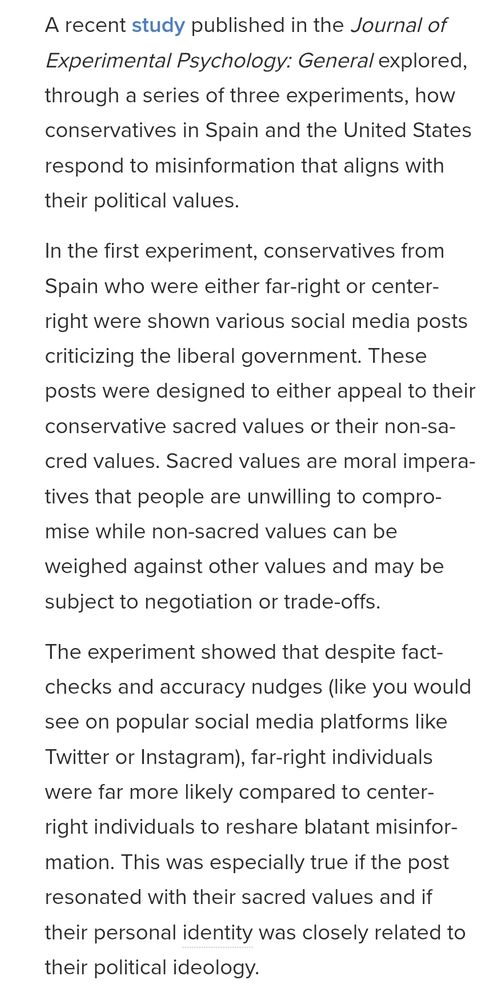
A recent study published in the Journal of Experimental Psychology: General explored, through a series of three experiments, how conservatives in Spain and the United States respond to misinformation that aligns with their political values.
In the first experiment, conservatives from Spain who were either far-right or center-right were shown various social media posts criticizing the liberal government. These posts were designed to either appeal to their conservative sacred values or their non-sacred values. Sacred values are moral imperatives that people are unwilling to compromise while non-sacred values can be weighed against other values and may be subject to negotiation or trade-offs.
The experiment showed that despite fact-checks and accuracy nudges (like you would see on popular social media platforms like Twitter or Instagram), far-right individuals were far more likely compared to center-right individuals to reshare blatant misinformation. This was especially true if the post resonated with their sacred values and if their personal identity was closely related to their political ideology.
Experiment #1:
Despite fact-checks and accuracy nudges, far-right individuals were far more likely compared to center-right individuals to reshare blatant misinformation - especially if it resonated with their sacred values & if their personal identity closely related to their political ideology.
18.02.2025 00:03 — 👍 0 🔁 0 💬 1 📌 0

Why Some People Turn Into Political Extremists
In the post-truth age, we will believe anything as long as it echoes us.
Why Some People Turn Into Political Extremists
Understanding emotional and societal factors behind misinformation spread is key. The issue means debunking false information but also involves addressing extremists’ need for social belonging and affirmation.
www.psychologytoday.com/us/blog/soci...
18.02.2025 00:00 — 👍 0 🔁 0 💬 1 📌 0
I've seen a lot of people, even Dems, swear they wouldn't be coming after states when it is obvious they are going to do so. People really seem to not get just how bad this is going to all be.
17.02.2025 23:46 — 👍 2 🔁 0 💬 0 📌 0
The pilot did such a good job though for landing it safely as they could. Imagine having to land it upside down.
17.02.2025 23:39 — 👍 0 🔁 0 💬 0 📌 0
One of the things you are seeing right now is federal employees afraid to go on the record, plus inspectors generals are fired. Qualified and credible voices who know the inner workings of govt are afraid to rebut DOGE's bullshit.
This is a real and incredibly consequential chilling effect!
17.02.2025 18:20 — 👍 558 🔁 124 💬 21 📌 4
I wonder how Trump's has been resolved. Seems like whomever is supposed to enforce them isn't and I don't know who that responsibility actually falls upon.
17.02.2025 23:33 — 👍 1 🔁 0 💬 0 📌 0
That's also absolutely not true about his security clearance.
17.02.2025 23:27 — 👍 1 🔁 0 💬 1 📌 0

The new study has three important results. First, it found that how empathetic we are is partly due to genetics. Indeed, a tenth of this variation is due to genetic factors. This confirms previous research examining empathy in identical versus non-identical twins.
Second, the new study confirmed that women are on average more empathetic than men. However, this difference is not due to our DNA as there were no differences in the genes that contribute to empathy in men and women.
This implies that the sex difference in empathy is the result of other non-genetic biological factors, such as prenatal hormone influences, or non-biological factors such as socialisation, both of which also differ between the sexes.
Finally, the new study found that genetic variants associated with lower empathy are also associated with higher risk for autism.
How empathic we are is not just our experiences experience but also our genes
- How empathetic we are is partly due to genetics (10%)
- Women are on average more empathetic than men, but not due to genetics
- These variants also associate with higher risk for autism
www.cam.ac.uk/research/new...
17.02.2025 23:18 — 👍 0 🔁 0 💬 0 📌 0
Ugh. It's paywalled using that link too, unfortunately.
17.02.2025 03:57 — 👍 1 🔁 0 💬 1 📌 0
Thank you!!
17.02.2025 03:56 — 👍 1 🔁 0 💬 1 📌 0
Paywalling stuff right now is so unethical. I wish the press would stop paywalling at least anything related to what's happening now.
17.02.2025 03:43 — 👍 1 🔁 0 💬 1 📌 0
Also funny because Natsios works at Texas A&M's Bush School. They rarely speak up on issues like this but is says something that he is.
17.02.2025 03:28 — 👍 1 🔁 0 💬 0 📌 0
I had a job interview one with Andrew Natsio. Still sad I didn't get it. He told me I was everything they were looking for in a candidate. Then I never heard back.
17.02.2025 03:25 — 👍 0 🔁 0 💬 0 📌 0
@heathervogell.bsky.social do you have a Signal?
16.02.2025 20:32 — 👍 0 🔁 0 💬 1 📌 0
Well drat. Let's try a non-fed site.
This link references it and provides a summary:
firstamendment.mtsu.edu/article/jack...
Here's a link to download the full report: electionlawblog.org/wp-content/u...
16.02.2025 15:16 — 👍 3 🔁 0 💬 1 📌 0
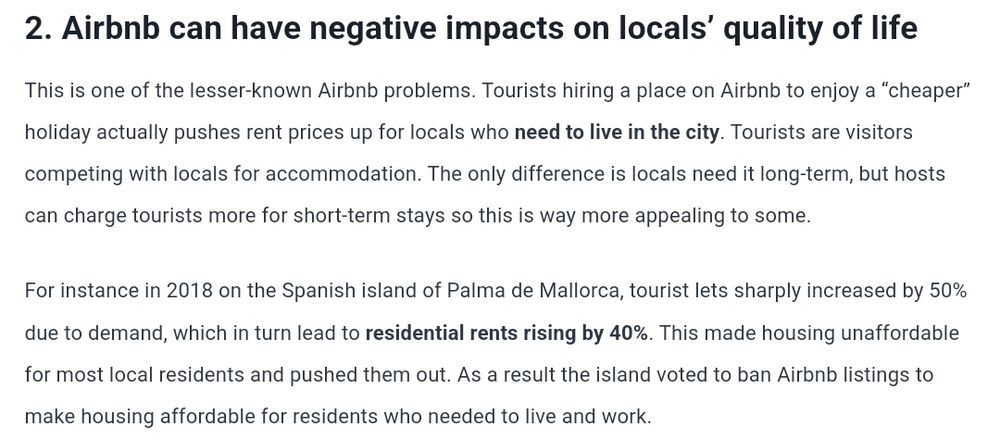
Airbnb is an extremely unethical company for many reasons.
www.theinvisibletourist.com/why-you-shou...
They also support Trump.
www.newsweek.com/american-businesses-supporting-donating-donald-trump-list-2027957
16.02.2025 07:00 — 👍 0 🔁 0 💬 0 📌 0
Just a progressive scientist who actually cares more about people than scoring points. What's so wrong with being compassionate and caring? It's a lie that we have to trample our neighbors in order to succeed.
Nice and mean at the same time. Practical Democrat. Yelling "dO sOmEtHiNg" is doing nothing. I blame republicans for what they're responsible for because I tell the truth. I just want to get things right.
Freelance writer and editor. Formerly of The Atlantic, Boston Review. Copy chief at Columbia Magazine.
Harris 2024 Team • Biden 2020 Team •
Bard College (NY)• University of Copenhagen • Former writer/editor/talent scout: London Summer Jam • Member of the Opposition • #BlueWave2026 • 2x Brain Tumor Survivor • Bluesky since Nov. 2024 🦋
Hosted by Sam Seder & Emma Vigeland. MR is an unbought, unbossed daily political talk show. Awarded @PodcastAwards Best Political Podcast 5 times #LeftIsBest https://majorityreportradio.com/about
LGBTQ+ safe
Marginalized People Advocate
Book lover
Dog/cat owner
My wife has an awesome wife!!!
Data Editor, @thetimes.com
I write a weekly data column called Go Figure
🔗 https://www.thetimes.com/profile/tom-calver
📧 thomas.calver@the-times.co.uk
independent writer of citationneeded.news and @web3isgoinggreat.com • tech researcher and cryptocurrency industry critic • software engineer • wikipedian
support my work: citationneeded.news/signup
links: mollywhite.net/linktree
Real-time historian of the late cyber capitalist era @TechCrunch. Posts about infosec, surveillance by day. 🍕, ⚽️, 🎸, 🎮 by night.
☎️ Signal: +1 917 257 1382
Past lives: VICE Motherboard, Mashable, WIRED.
Security reporter for WIRED Magazine. she/her/my man. Signal +1 (347) 722-1347
Senior Reporter @Wired covering platforms + power
https://www.wired.com/author/vittoria-elliott/
Signal: velliott88.18/vittoria89.82
elliott.vittoria@proton.me OR vittoria_elliott@wired.com
Security writer @wired.com
Cybercrime, privacy, surveillance, and more.
Signal: mattburgess.20 | Email: matt_burgess@wired.com
Journalist, Author, Podcaster, Dog Walker
National Security Reporter. Features in Politico, Rolling Stone, Wired, Foreign Policy. Working on a book on the history of deep cover for Penguin-Random House.
It’s always Berlin 1989 somewhere. Email: thebrushpass1@protonmail.com
Investigative reporter at The New York Times. Co-author of Lucky Loser, an investigation into how Donald Trump squandered the fortune that led him to The White House. 🗞️ 🇨🇦
NYT (@nytimes.com) covering TikTok and emerging media. love consumer-y business news. former retail and advertising reporter. pun fan, Tar Heel, CT native, toddler mom - contact me at sapna@nytimes.com or Signal me directly @Sapna.87
Senior Staff Editor, general-assignment and breaking news, The New York Times.



![The research also showed it remained easier to get audiences to accept racism as a real and pressing problem than to get them to support particular solutions.
“If we want to end racism and entrench anti-racism it is critical to build public demand for deep and irreversible progress,” said Sanjiv Lingayah, report author and director of Reframing Race. “[This] shows there is still a way to go. The data shows significant attachment to deep-seated and debunked myths about ‘race’. More positively, the findings show that the public can understand systemic racism and that they can be rallied around far-reaching anti-racist solutions.”](https://cdn.bsky.app/img/feed_thumbnail/plain/did:plc:xej3e5jl7pnnsytmypwn5nuz/bafkreiarkxy5knawzgwcl2tiqrs7edaigt4cajyh25pna2xyetyfbzxjce@jpeg)











